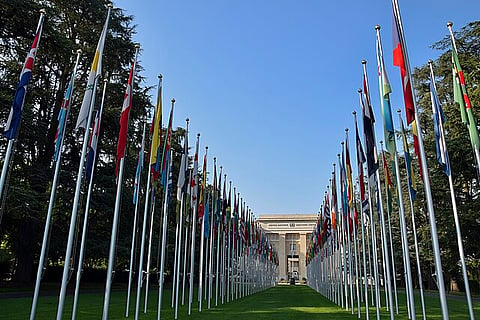

The United States has sparked international criticism after becoming only the second nation to boycott a mandatory United Nations human rights review, a move that has drawn sharp condemnation from human rights organizations and allies alike.
On November 7, 2025, the United States officially skipped its Universal Periodic Review (UPR) at the UN Human Rights Council in Geneva. The UPR is a process that all 193 UN member states must undergo every four to five years to have their human rights records examined by their peers.
The American chairs were left conspicuously empty as the meeting began. The council president, Jurg Lauber, formally noted the absence of the U.S. delegation. This act of non-participation is historically significant; since the process began in 2008, Israel had been the only country to previously skip a review in 2013, though it returned to the process nine months later. The U.S. administration had announced its intention to boycott the review as early as August 2025.
The Trump administration defended its decision by asserting that participation would be an endorsement of a flawed UN Human Rights Council, which it accuses of being a "hypocritical and self-serving organization" and a "cesspool of political bias". U.S. officials stated the council "makes a mockery of human rights" by allowing known human rights violators to be members and shielding them from scrutiny.
This stance is part of a broader policy of skepticism toward international oversight. The administration had already withdrawn the U.S. from the Human Rights Council in early 2025, reversing the Biden administration's re-entry. A central U.S. complaint is the council's "unending hostility towards Israel," including a permanent agenda item dedicated to the Israeli-Palestinian conflict. However, analysts note the withdrawal also followed sharp UN criticism of U.S. domestic policies, such as the separation of migrant families at the border.
The U.S. boycott was met with immediate regret and criticism from other nations and human rights advocates. A diplomat from Cyprus expressed regret on behalf of the European Union, stressing the importance of the UPR's universality. China's representative accused Washington of showing a "lack of respect for the UPR mechanism," while Cuba argued the U.S. was avoiding scrutiny of its own record.
Human rights organizations were blunt in their assessment. The American Civil Liberties Union (ACLU) called the move "shocking" and warned it sets "a dangerous example that will further weaken universal human rights at home and abroad". Chandra Bhatnagar, executive director of the ACLU of Southern California, highlighted that the world is watching the U.S. government "attacking the constitutional and human rights of its own people". A coalition of immigrant rights groups denounced the boycott as a "staggering attempt to skirt international accountability" for domestic abuses.
Despite its absence, numerous reports detailing alleged U.S. human rights violations were submitted to the UPR process by organizations like Human Rights Watch and the ACLU. These documents cited concerns over arbitrary detention, abusive treatment of immigrants, regression in sexual and reproductive rights, rollbacks on LGBT rights, systemic racial discrimination, and attacks on the rule of law.
The Trump administration's policy of separating migrant children from their families at the border had previously been condemned by the UN human rights chief as "unconscionable". Immigrant advocacy groups now warn of an "escalating abuse of immigrants and asylum seekers," including mass arbitrary detention and denial of due process.
The U.S. absence is seen as more than a diplomatic snub; it represents a fundamental shift and a blow to the credibility of the international human rights system. The UN's own human rights chief, Volker Türk, had earlier lamented a "fundamental shift in direction" in the United States on human rights.
Human rights advocates fear that the U.S. action could empower autocratic governments to follow suit and evade their own international obligations. By walking away from this process, the U.S. is seen as abdicating its traditional role as a global leader in human rights. In response, civil society groups are organizing a "People's UPR" to ensure that evidence of abuses in the U.S. is still presented to the international community.